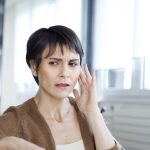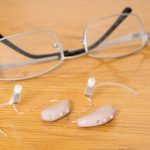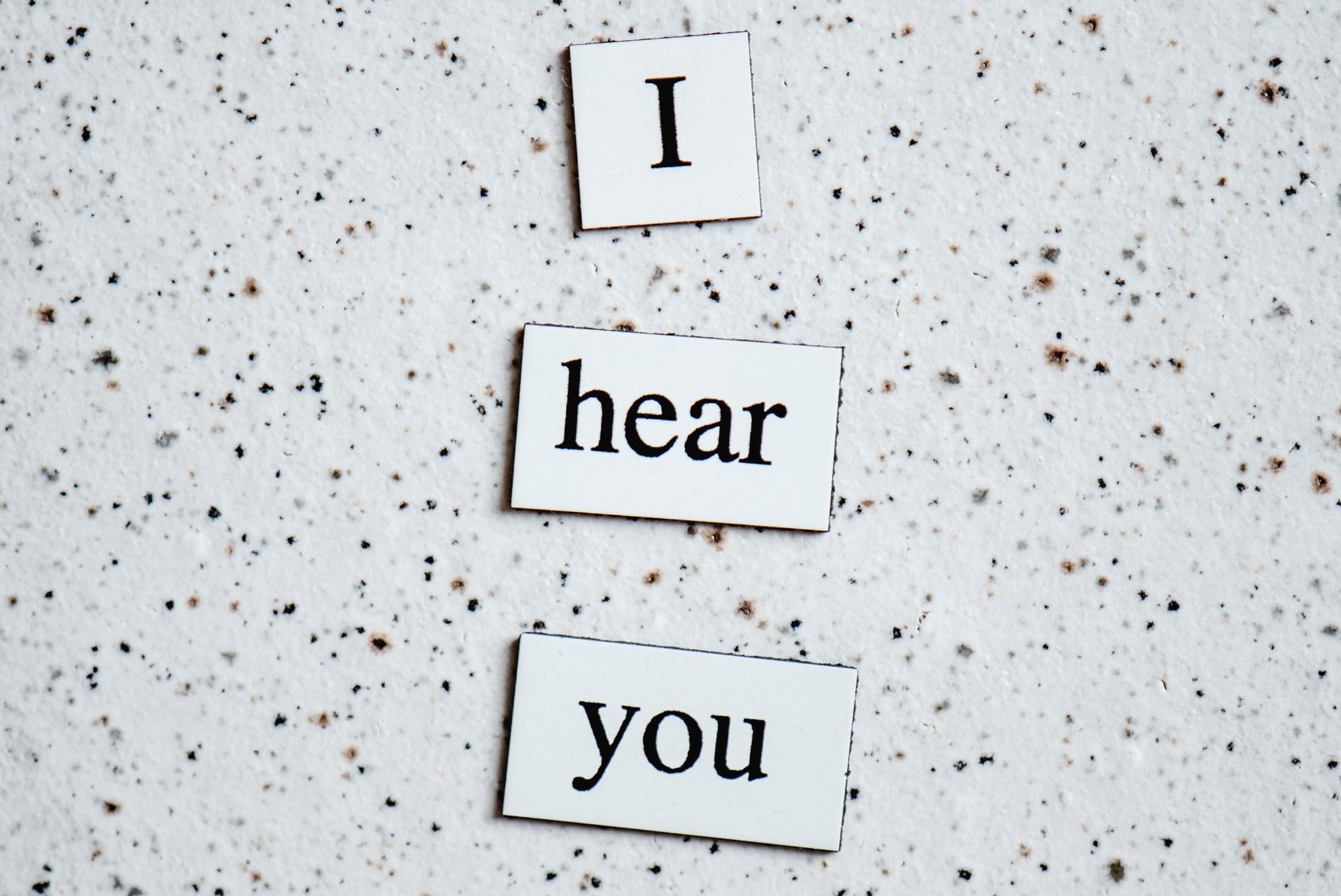
Muffled hearing can be a disconcerting sensation, and while it can have a simple, easily curable causes, it can also occur as a result of something more serious. Here’s everything you need to know.
Contents
What is Muffled Hearing?
When you have muffled hearing in one ear you generally experience a ‘plugged up,’ blocked,’ or ‘full’ feeling. This can sometimes feel like you have something in your ear, clogging it up.
Muffled hearing is often a type of conductive hearing loss, meaning sound waves struggle to enter the inner ear from the middle and outer ear. Affecting either one or both ears, muffled ears often occur suddenly, but it can also develop slowly over time.
Although a muffled ear isn’t a complete loss of hearing, you might struggle to hear things clearly, and mishear your friends and colleagues during conversations. The cause of your muffled hearing will determine the severity of your case.
Muffled Ear Symptoms
In addition to this feeling of your ear being ‘clogged up’, you might experience a few more symptoms in the ear such as:
- Pain
- A feeling of fullness
- Discharge
- Ringing
The symptoms that you experience will also depend on the cause of your muffled hearing.
Common Causes of Sudden Muffled Hearing
There are a few different causes of sudden muffled hearing:
- Excessive ear wax (cerumen) – ear wax is a natural lubricant and serves a protective function, however, if this builds up in the ear canal (and dries over time), it can cause a blockage. If you have an impacted ear, you might struggle to hear, have earache, experience extreme pressure, or have ringing in the ear.
- Illnesses and infections – an ear infection can cause muffled hearing or hearing loss as fluid builds up in the middle ear, blocking sound trying to enter the inner ear. For example, ‘swimmer’s ear’ is common amongst swimmers or people who spend a lot of time underwater. It occurs when there is an infection of the skin inside the ear canal due to water that contains bacteria entering the ear. This leads to an inflammation of the ear, causing the ear canal to be narrowed or blocked. Conditions such as Ménière’s disease, associated with abnormal fluid in the inner ear, can also be responsible for the sensation of having a muffled ear.
- Common cold – when congestion blocks the Eustachian tube, it can lead to muffled hearing. When your congestion goes down, your symptoms usually go away.
- Sinus Infection – Infections can cause sinus drainage, triggering ear congestion and muffled hearing.
- Hay fever (allergic rhinitis) – symptoms can be like those of a cold and sinus infection, and any muffled hearing caused should reduce once your allergies subside.
- Loud noise – a burst of extremely loud sound such as an explosion, gunfire, and an alarm can damage your hearing (in one or both ears) by tearing a hole in the eardrum or damaging small bones in the middle ear.
- Foreign objects getting stuck in the ear – such as a wad of cotton, a small bug, or a child’s toy can lead to hearing loss.
.
- Medications – some medications such as aspirin and ibuprofen are known to damage hearing (temporarily or permanently). They can cause hearing loss or sometimes even tinnitus (ringing in the ears). This is usually only a concern with large doses of these drugs, but everyone reacts differently to medications and risks are still present. Some drugs are known to be ototoxic (harmful to the ears) by damaging inner ear nerve cells. Some antibiotics, loop diuretics, and chemotherapy drugs are amongst those known to pose a risk to your hearing.
- Head or brain injury – blunt force can damage the tympanic membrane, middle ear, and nerve cells in the cochlea, leading to symptoms such as muffled hearing, hearing loss, and tinnitus.
- Airplane ear – when you’re flying there is an imbalance of the air pressure in the middle ear and the air pressure in the surrounding environment. Sometimes this can cause ear pain, and muffled hearing. Although it usually disappears after your flight and shouldn’t be serious, it can persist for longer or result in hearing loss (or even tinnitus).
If your muffled hearing develops gradually, it could be presbycusis (age-related hearing loss).
Muffled hearing in one ear often has a different cause to muffled hearing in both ears. Perforated eardrum, earwax buildup, noise damage, and tumors are likely to cause muffled hearing in one ear, while airplane ear, age-related hearing loss, noise damage and medication can cause hearing loss in one or both ears.
Can You Get Rid of Muffled Hearing?
Depending on the cause, you might be able to get rid of your muffled hearing. When you experience the symptoms, the sooner you see your doctor, the better your chances. Your muffled hearing might have an underlying cause that requires speedy diagnosis and treatment. Nevertheless, there is a chance that your muffled hearing is permanent. This can be troubling for people to hear, however, there are still effective treatment options available such as hearing aids that can significantly reduce your symptoms.
How and When to Treat Muffled Hearing
As soon as you experience muffled hearing (or any form of hearing loss), you should make an appointment with your physician as soon as possible. They will be able to talk through your symptoms with you or refer you to a specialist where you can have a thorough medical examination and comprehensive hearing test.
The treatment for muffled hearing will depend on its cause. For example, if it is caused by impacted ear wax or a foreign object stuck in the ear, these will be removed. If you have a sinus or middle ear infection, you will be given antibiotics to treat it.
If there is a serious underlying medical issue causing your symptoms, this will be diagnosed and treated accordingly. When this issue is resolved, your hearing problems should also go away.
Ear surgery may be required in extreme cases, such as to repair a perforated eardrum.
If there doesn’t seem to be a cause of your muffled hearing, or noise damage or age-related hearing loss are the best explanation of your symptoms, there might not be any ‘treatment’ available. Getting a hearing aid fitted might be the most effective option for you, as they can significantly improve your ability to hear.
Protecting Your Ears From Getting Sudden Hearing Loss
There are a few things you can do to help protect your ears against sudden hearing loss. Eating a healthy diet rich in vitamins and minerals can help maintain general ear health, reducing the risk of ear infection, and improving circulation to nerve cells.
Loud noises can also cause hearing loss, instantly or over a long period of time. This means that while your hearing can feel fine, the full extent of any noise damage will be felt years into the future, if not immediately. This damage can be temporary but is often permanent, so it is extremely important to protect your ears by listening to music and the TV at a sensible volume and using protective ear gear at loud events or workplaces.
Activities to avoid also include putting foreign objects into your ears, such as fingers or cotton swabs, as they can push wax into the ear canal and increase the risk of impaction or damage your eardrum. Your body should naturally expel wax by itself. When this happens, simply wipe it away.
If you experience muffled hearing or sudden hearing loss in one or both ears, contact your doctor as soon as possible.
To read more about hearing loss and ear health, see our other blog posts.
The information in this guide has been written using the following reliable sources:
https://www.miracle-ear.com/blog-news/muffled-hearing-loss-in-one-ear
https://www.healthline.com/health/muffled-hearing
https://www.webmd.com/healthy-aging/hearing-muffled
https://www.specsavers.co.uk/hearing/ear-health/muffled-hearing
https://www.healthyhearing.com/report/52879-Why-do-my-ears-feel-clogged
https://www.uofmhealth.org/health-library/tf3092








